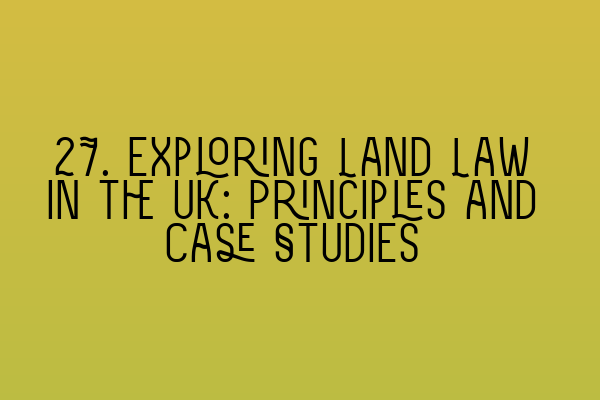27. Exploring Land Law in the UK: Principles and Case Studies
Welcome to SQE Property Law & Land Law, your trusted solicitors in the UK. In this blog post, we will delve into the fascinating realm of land law, exploring its fundamental principles and examining real-life case studies. Whether you are a law student preparing for the SQE exam, a legal professional seeking to refresh your knowledge, or simply someone interested in the intricacies of land law, this article aims to provide you with valuable insights and useful information.
Understanding Land Law: An Overview
Land law is a complex and multifaceted area of law that deals with the legal rights and obligations associated with property ownership and land use. It governs various aspects, including the transfer of property, the creation and enforcement of property rights, and the resolution of disputes relating to land. Understanding the fundamental principles of land law is crucial, as it forms the bedrock upon which property transactions and land disputes are resolved.
Basic Principles of Land Law
Land law is built upon a few key principles that underpin property ownership and land use. These principles include:
- Legal Title: Legal title refers to the formal documentation that establishes ownership rights over the land. It includes the registered title, which is recorded with the Land Registry, and the unregistered title, which relies on historical documents to establish ownership.
- Equitable Interests: Equitable interests arise when a person holds an interest in land that is recognized by equity, even if it is not formally registered or recorded in the legal title. These interests can include beneficial interests, mortgages, and other proprietary rights.
- Estates and Interests: Estates and interests refer to the rights and privileges associated with land ownership. These can be freehold estates, leasehold estates, easements, restrictive covenants, or other forms of legal or equitable interests.
- Legal Formalities: Land transactions and transfers are subject to various legal formalities, such as the execution of contracts, the payment of stamp duty land tax, and the registration of the transaction with the Land Registry.
- Land Registration: The Land Registry plays a vital role in land law by maintaining registers of land ownership and interests. Registration provides certainty, enhances transparency, and facilitates the smooth transfer of property rights.
Case Studies in Land Law
Let’s now explore some intriguing case studies that highlight the practical application of land law principles:
- Case Study 1: Co-ownership Dispute: In this case, two individuals jointly purchased a property but later fell into a disagreement regarding their respective shares. The court had to determine the extent of their ownership interests and resolve the dispute.
- Case Study 2: Restrictive Covenants: In this scenario, a developer sought to build a new housing estate but faced challenges due to restrictive covenants imposed by prior owners. The court had to consider the enforceability and interpretation of these covenants.
- Case Study 3: Adverse Possession: This case involved a person who had occupied a piece of land for many years without legal ownership. The court had to decide whether they could acquire a legal title through adverse possession, thereby extinguishing the true owner’s rights.
These case studies demonstrate the intricacies of land law and how legal principles are applied to resolve disputes and determine property rights. By studying such cases, aspiring solicitors can gain a deeper understanding of the practical implications of land law principles.
Preparing for the SQE Exam
If you are a law student preparing for the Solicitors Qualifying Examination (SQE), it is essential to familiarize yourself with land law and its intricacies. Our SQE 1 Practice Exam Questions and SQE 1 Practice Mocks FLK1 FLK2 are invaluable resources to test your knowledge and enhance your exam preparation. Additionally, our comprehensive SQE 2 Preparation Courses and SQE 1 Preparation Courses offer tailored guidance to ensure you are fully equipped for success.
Conclusion
Land law plays a significant role in shaping property transactions, resolving disputes, and protecting individuals’ rights over land. By understanding its fundamental principles and studying real-life case studies, you can develop a solid foundation in this vital area of law. Whether you are embarking on a legal career or a property owner seeking legal advice, SQE Property Law & Land Law is here to provide expert guidance and support. For more information about our services or to explore the upcoming SRA SQE Exam Dates, please visit our website.
